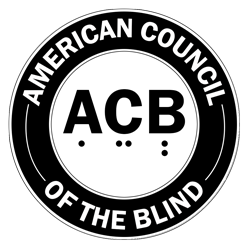
Greater New York Council of the Blind
A chapter of the American Council of the Blind of New York;
An affiliate of the American Council of the Blind
ACBNY Legislative Imperatives for 2025
The American Council of the Blind of New York (ACBNY) is a volunteer organization. Any and all questions should be directed to the Legislative Chair Martin Cahill at mcboltonst@gmail.com
or (914) 573-6987
ACBNY strongly supports A4039 (McDonald) and S1740 (Martinez) requiring pharmacies to provide prescription drug electronic readers.
As technology continues to advance and play an increasingly significant role in our lives, it is crucial to ensure that individuals who are visually impaired
or blind are not left behind. By mandating greater access to digital services, this legislation will open doors for individuals with a print disability to access essential information and services, thereby increasing their independence and overall health safety.
Having access to an accessible digital prescription label reader will allow the blind and low vision community to correctly manage their medication intake.
Without this technology, we are at risk of not following medical direction correctly, which could result in serious negative health outcomes. As we are
now living longer, the risk of vision loss increases. In New York State the number of older adults living with vision loss increased from 163,000 in 2021 to 193,000 in 2023. Ensuring accurate medication management is crucial and will reduce strain on the healthcare system. This technology exists and can be easily made available.
ACBNY strongly supports A574 (Steck) and 53144 (Cooney), requiring counties to expand paratransit beyond ADA minimums.
The Americans with Disabilities Act (ADA), mandates all counties that have a fixed route bus system to provide paratransit services to people with disabilities unable to take the fixed route bus. Service must be provided to locations within of a mile of the closest fixed route bus stop. While this is a minimum service, counties can and should provide transportation services to people with disabilities throughout their service area. As fixed routes get cut back, especially upstate, many people are left stranded with no transportation. As a result, blind people are too often isolated and unable to work, go shopping, or attend houses of worship, and the like, because they don't have reliable transportation. There is a real need to ensure comprehensive paratransit services are provided throughout the State.
ACBNY strongly supports The Infant Vision Information, Education and Wellness Act S7235 (Sanders) and A1562 (Taylor).
ACBNY joins the Executive Board of NYSCB in calling for the State to establish a mandatory infant/early childhood vision screening program so that vision-related deficits that can result in significant developmental delays can be detected and prompt referral for vision-related early intervention services can be made. New York State mandates such screening with respect to hearing, but astonishingly, there is no such mandate for vision screening. Tools exist, whether medical or educational, to mitigate the potentially devastating effects of untreated vision loss on the infant, their family, and their community. This bill would create an advisory board within the Department of Health to advise DOH on the creation of a system to screen each newborn in the state for vision
abnormalities and a system to educate parents of each newborn and infant on the merits of having vision screening performed and receiving follow-up care.
Visual problems discovered during infant vision screening are often indicators of other neurological issues, including autism. We believe that vision screening requirements should explicitly cover both newborns and children up to two years of age, as the best approach to assuring that vision-related issues not readily susceptible to detection at or near birth can nevertheless be detected as early as possible in a child's life.
ACBNY strongly supports A2190 (Lupardo) and S247 (Persaud), establishing licensing requirements for two categories of vision rehabilitation professionals, licensed orientation and mobility specialists, and licensed vision rehabilitation therapists.
As New Yorkers age, the number of persons with significant visual impairments is increasing. There is also an increase in the number of babies surviving prematurity, low birth weight, congenital conditions, and diseases. They often experience multiple disabilities including vision loss.
Orientation and Mobility (O&M) specialists provide people of all ages who are blind or visually impaired with instruction in the use of their remaining senses along with a prescribed white and red cane to enable safe navigation and independent travel in their environment. O&M specialists prepare people who are blind or visually impaired to attain mobility skills necessary to qualify for a guide dog.
Vision Rehabilitation Therapists (VRTs) provide training in the reading and writing of braille, safe cooking techniques, childcare, medication management,
keyboarding, and the use of adaptive technologies and skills that enable people who are blind to manage independently at home, at work, and in the community.
Licensure increases the number of qualified professionals who are specifically trained to meet the unique needs of people who are blind or visually impaired. Licensure assures the provision of quality services through regulation and examination of these professionals. Licensure promotes consumer safety and ensures that individuals who are blind have access to trained professionals who have received specialized supervised training in working with people who are blind or visually impaired.
Become a Member
To become a member of GNYCB,
send an email to our Membership Chairperson for more information.
Pay Dues / Pay for an Event / Donate via PayPal to GNYCB
Click the Pay Now button to pay with a credit card via PayPal.
Go to the homepage
